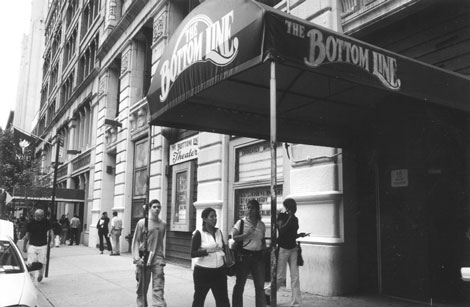By Lincoln Anderson
A last-minute offer by Sirius Satellite Radio to pay off The Bottom Line’s $185,000 back rent to its landlord, New York University, has staved off eviction for the famous Village music club — for now.
Under the agreement, worked out in daylong negotiations before Justice Jose A. Padilla Jr. last Wednesday, Sirius will put the money in an escrow account. The parties are due back in court Oct. 23. If at that time, N.Y.U. offers The Bottom Line a 10-year lease, the university will get the payment. However, in order to be offered the lease by N.Y.U., The Bottom Line must show that it has come up with funds for an exterior and interior renovation of the almost 30-year-old club, located at Mercer and W. Fourth Sts.
Despite the offer by Sirius, N.Y.U. reportedly initially moved for a trial, indicating it wanted to proceed with an eviction. However, in light of Sirius’s proposal, Padilla convinced N.Y.U. to reconsider. A pack of reporters from music media and newspapers in the courtroom added pressure on the university to negotiate.
In an Oct. 24 statement, N.Y.U. spokesperson John Beckman said, “As we have said, the university recognizes the Bottom Line’s cultural value, and for that reason we have not been looking to see the Bottom Line close…. We were prepared to go to trial today; however, during a [court] recess, we had the most productive and realistic conversations to date with the Bottom Line…. N.Y.U. has been very patient over the past three years in this matter; and, we are once again extending ourselves in that regard. However, the Bottom Line must use this next 30 days constructively. It is our considered hope that they will.”
Allan Pepper, who owns the club with his partner, Stanley Snadowsky, was thankful for the stay of eviction, but was cautiously optimistic.
“It’s only a first step,” he said. “All it did was stop the clock for a month because we’re back in court Oct. 23. So I’m grateful for the breather to try to get this together.”
In addition, as part of the deal offered by Sirius, if N.Y.U. offers the Bottom Line a 10-year lease, the radio station would give $10,000 in scholarships to N.Y.U. students and offer N.Y.U. students internships at the station.
Since June, in an arrangement with the club, Sirius has broadcast performances from the Bottom Line, having aired 20 shows so far. But the radio station isn’t seeking anything additional for putting up the money to save the club, according to Pepper.
“They asked for nothing,” he said of the satellite radio company, which broadcasts programmed music and talk shows on 50 radio stations. Pepper said WFUV, a small music station the broadcasts from Fordham, helped get the word out, directing listeners to the Bottom Line’s Web site, where they were urged to join a letter-writing campaign to N.Y.U.
“A small broadcaster and a corporate entity, these two entities came together, literally, because they love the music. It’s like a fairy tale,” Pepper said. “It’s an incredible story.”
Pepper noted it was Meg Griffin, a veteran New York deejay and personal friend who programs two Sirius stations, who had the idea for Sirius to step in.
But the club must still raise money for the renovations, which Pepper said is needed to convince N.Y.U. the club won’t be in the same financial predicament six months from now. In addition, they need funds to pay off legal fees from fighting the eviction.
What they’re looking for is a financial partner, Pepper said, ideally someone “who loves music or whose mission is to be involved with music, or maybe there’s a wealthy individual who wants to help out.”
As for N.Y.U.’s holding up its end of the deal, Pepper said, “I take them at their word.” Pepper did not reveal how much the renovations will cost.
The club owner noted he was heartened to see an editorial in the Washington Sq. News, N.Y.U.’s student newspaper, come out strongly urging the university to let the club to stay.
“N.Y.U. has always been perceived as being at odds with the Village community — the demolition of the Poe and Judson houses in 2001 to make way for a new law school building being one prominent example,” the W.S.N. editorial stated. “N.Y.U.’s leniency with the Bottom Line and its willingness to negotiate despite the club’s substantial debt should go a long way in convincing students, alumni and community members that N.Y.U. is concerned with preserving both Village culture and its real estate.”
N.Y.U. students flooded the administration with e-mails begging the university to not evict the club.
“It’s even coming from the students,” Pepper said. “I was very happy to see that. They understand that this is a place of historical significance.”






































